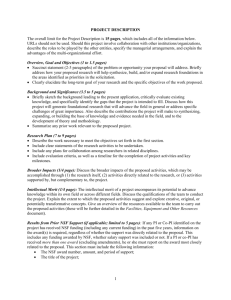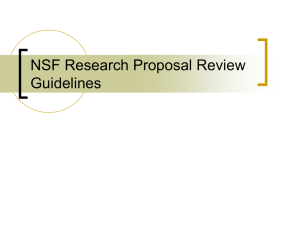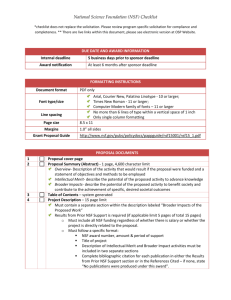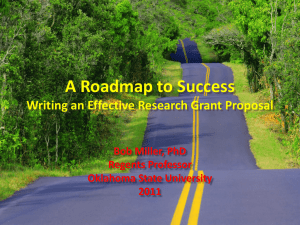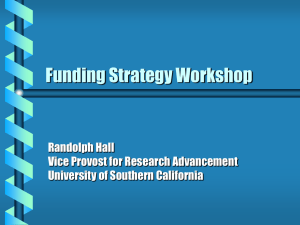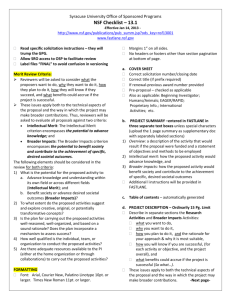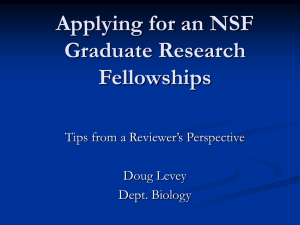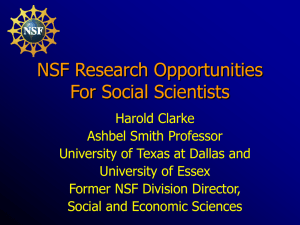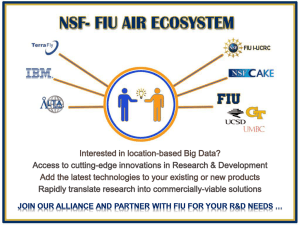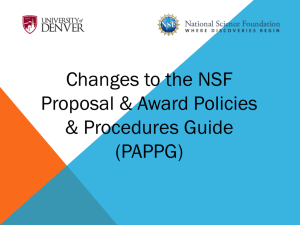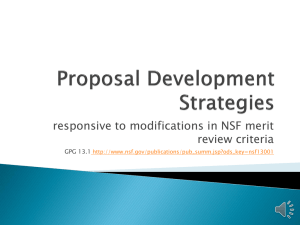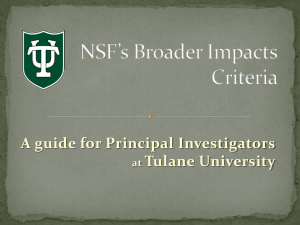career - Office of Research
advertisement
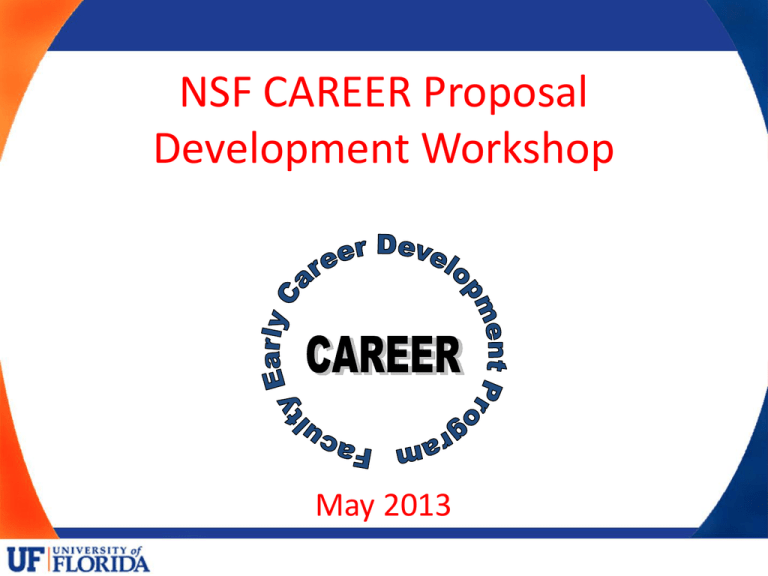
NSF CAREER Proposal Development Workshop May 2013 Jennifer Sinclair Curtis Associate Dean for Research and Facilities, College of Engineering 392-0946 jcurtis@che.ufl.edu Sobha Jaishankar Assistant Vice President Research Program Development, UF Office of Research 392-8247 sjaishan@ufl.edu Recent NSF CAREER Award Recipients Bin Gao, Agricultural and Biological Engineering, bg55@ufl.edu Greg Stitt, Electrical and Computer Engineering, gstitt@ece.ufl.edu Treavor Boyer, Environmental Engineering Sciences, thboyer@ufl.edu Nico Cellinese, Biology, ncellinese@flmnh@ufl.edu Nicholas Polfer, Chemistry, polfer@chem.ufl.edu Documents • 2013 NSF Faculty Career Development Program Summary – http://www.nsf.gov/pubs/2011/nsf11690/nsf11690.pdf • Broader Impacts - FAQs • Broader Impacts – What NSF is looking for – UF Resources • Tips from 16 Successful Faculty • My Slides • Sample Proposals – Melissa Hilleary will send CAREER: The Faculty Early Career Development (CAREER) Program • NSF’s most prestigious awards in support of junior faculty • Emphasizes outstanding research, excellent education and the integration of education and research • A PI may submit only one CAREER proposal per annual competition. – may not participate in more than three CAREER competitions. • Encourages submission especially from women, members of underrepresented minority groups, and persons with disabilities CAREER Program “A Foundation-wide activity that offers the National Science Foundation’s most prestigious awards in support of junior faculty who exemplify the role of teacher-scholars through outstanding research, excellent education and the integration of education and research within the context of the mission of their organizations.” CAREER Program • Funds the academic career development of new faculty (it is not purely a research award) • Is based on a development plan, ”a well-argued and specific proposal for activities that will, over a 5-year period, build a firm foundation for a lifetime of contributions to research and education” – much more than a “regular” proposal • The CAREER proposal is a proposal detailing how you will spend $400,000 to enhance your career development (or $500,000 for BIO and OPP) PECASE Each year NSF selects nominees for the Presidential Early Career Awards for Scientists and Engineers (PECASE) from among the most meritorious recent NSF CAREER awardees. No application for PECASE and up to 20 are selected each year. Selection criteria: 1) innovative research at the frontiers of science and technology that is relevant to the mission of the sponsoring organization or agency, and 2) community service demonstrated through scientific leadership, education or community outreach. Eligibility • Hold a doctoral degree by the deadline date in a field supported by NSF • Be untenured until October 1 following the deadline, not an Associate Professor • Have not previously received a CAREER award • Be employed in a tenure-track (or tenuretrack-equivalent) position as an assistant professor by October 1st following the deadline • No citizenship requirements, except PECASE Deadlines • Full Proposal Deadline Date: July 22, 2013 BIO (Biological Sciences), CISE (Computer and Information Sciences), HER (Education and Human Resources), OCI (Cyberinfrastructure) • Full Proposal Deadline Date: July 23, 2013 ENG (Engineering) • Full Proposal Deadline Date: July 24, 2013 GEO (Geosciences), MPS (Mathematical and Physical Sciences), SBE (Social, Behavioral and Economic Sciences), OPP (Office of Polar Programs) NSF Award Criteria • Intellectual merit – – – – – Importance in advancing knowledge/understanding in a field Creativity and novelty of approach Qualification of investigator Completeness of research plan Access to resources • Broader impacts (take seriously and be innovative – equal weight with Intellectual Merit – not an afterthought) – – – – – Promotion of teaching and training Inclusion of under-represented minorities Enhancement of infrastructure and partnerships Dissemination of results Benefits to society, use of use of research results to inform science policy Critical Elements • Research and education/outreach – best CAREER proposals integrate both • Departure from Ph.D. work • No co-PIs are permitted • Logistics – Follow-up: check for successful submission – Fix errors through FastLane before deadline (start early) – About 1% of proposals returned unreviewed Project Summary Most important page Three sections Overview My long-term research goal is…In pursuit of this goal, the research objective of this CAREER proposal is… and the research approach is My long-term educational goal is…In pursuit of this goal, the educational objective of this CAREER proposal is…and the educational approach is… Intellectual Merit – contribution made to the knowledge base Broader Impact – benefits to society not just educational outreach Describes work and its importance and you can do it 4600 characters max Research Objective To test hypothesis X To measure parameter X with accuracy Y To prove conjecture X To apply method X from area Y to solve problem Z in area W (integration of knowledge) Fundamental research is not really develop, design, optimize, control, manage “Learn how to” statements not clear what direction research will take Rest of the Proposal The next 15 pages of your proposal give backup and detail to your summary Start with a restatement of your goals and objectives, clarify them, and provide a plan to accomplish them Restate and provide detail on your intellectual merit and broader impact – Broader impacts needs its own separate section Task statements should detail the tasks needed to accomplish your objectives Results of prior NSF support if applicable in both intellectual merit and broader impacts Include details on international/global dimensions (how activities fit in global context, any international engagements) and cross-disciplinary activities (partnerships with industry, national labs, schools, museums but no coPIs) Research Topic • • • Is innovative and pushes the frontiers of knowledge Contributes to national needs and priorities NSF does not support (except as incidental to the goals of the award) Design of …. Commercialization Research Goal Focus on lifelong research goals – Don’t end with a single project – May never end – Have broad application Examples – To improve our ability to make engineering decisions under uncertainty and risk – To perform large-scale modeling of engineering systems thereby enabling better system optimization – To improve our understanding of metal cutting operations enabling improvements in machining Research • Your career involves a research path, not a research project • Determine your research path – your lifelong research goals - and then identify milestones toward your goals • Detail the first one or two as the research projects for your CAREER proposal Broader Impacts Means to benefit society include: – Economic/environment/policy – Education and training – Providing opportunities for underrepresented groups – Improving research and education infrastructure Education Undergraduate • – Curriculum, new course or new minor • – Research Projects (we have Center for Undergrad Research) Graduate • – Curriculum • – Conferences • – Involvement with industry, national labs Public access website, develop an app K-12 outreach (we have Center for Precollegiate Training/Outreach) Museum exhibits (we have Florida Museum of Natural History) Sustainability of innovation, You do not have to promise to do all this, pick 2-3 things and do them well CAREER Education Plan Tips • Provide statement of philosophy towards education • Provide concise review of pertinent literature and/or rationale for your approach – shows you are serious in the area • Focus on innovative, highly leveraged (impact) programs – may also plug into existing programs 21 CAREER Education Plan Tips • Need evaluation plans -both formative (immediate) and summative (cumulative) – we have an evaluation center at UF • Outline meaningful dissemination plan (partners, pyramids, social networks) • Include diversity component (we have SEAGEP, FGLSAMP and many others) • International component (we have UF International Center) 22 Supplementary Documentation • Letters of collaboration, 1 page max • No letters of recommendation for PI • Length of departmental letter, 2 pages, must include specific elements – PI’s activities integrated into goals of department and UF – Department is committed to support of PI, mentoring of PI – Certifying PI is eligible • Post-doc mentoring must be included (one page), if post-doc funding in budget • Data management plan – dissemination and sharing of data, publications, samples, physical collections, software and models http://research.ufl.edu/research-program-development/proposaldevelopment-resources.html Write to the Reviewers Write to the reviewers – not to your PhD/post-doc advisor and not to yourself It is a proposal, not a manuscript Your proposal will be judged by the panel reviewers The review panel members will have broad expertise Also backgrounds/views of program managers CAREER PROPOSAL TIPS Help the reviewers - Directly answer their reviewer questions for both intellectual merit and broader impacts 1. What is the potential for the proposed activity to: a. Advance knowledge and understanding within its own field or across different fields b. Benefit society or advance desired societal outcomes 2. To what extent do the proposed activities suggest and explore creative, original, or potentially transformative concepts? 3. Is the plan for carrying out the proposed activities well-reasoned, well-organized, and based on a sound rationale? Does the plan incorporate a mechanism to assess success? 4. How well qualified is the individual, team, or organization to conduct the proposed activities? 5. Are there adequate resources available to the PI (either at the home organization or through collaborations) to carry out the proposed activities? 25 CAREER PROPOSAL TIPS Establish your credibility in problem area and amongst your community – Evidence the quality of your past work – Walk the modest/bragging line Clearly tell story of how you envision your career will develop Make it clear that you have necessary resources, from routine to unique Use formatting – bold, underline, italics to add effect and call attention to important details. CAREER PROPOSAL TIPS Have others review your proposal !! Ask someone outside your field to read Project Summary and Introduction – have a first completed draft ready three weeks before deadline If you are finishing proposal one hour before deadline, likely not to fair well It is a single investigator proposal No dependent collaborators, ‘we’, …… Scope the work for the minimum budget Proposal is 5 year award for ~$400-500K (money for broader impacts included) Career = 30+ years The Broader Impacts plan can be deciding component 27 Successful Proposals • • • • • • Stress the novel aspects of your approach Differentiate your work from that done by others Support your ideas with preliminary results Include figures and graphs to facilitate understanding Show where the research might lead Describe applications that could result from the research 28 • • • • • • • Pitfalls Failure to establish significance or excitement about your work world will be a better place Too much text devoted to complex details Goals are buried in proposal Too ambitious for time/money Inadequate skills or credentials for proposed task Poor English, grammar, sloppiness – it counts Use of small fonts (strongly encourage 12 point font) and illegible materials/graphics, aggravates reviewers FAILURE TO ADHERE TO SUBMISSION REQUIREMENTS follow the guidelines if you have questions, contact one of us, contact PO 29 Selecting Program • Closest to your strengths • View past awards http://www.nsf.gov/crssprgm/career/awards.jsp • Contact program officer for advice http://staff.nsf.gov/ – Send project summary – Visit and take 2 page outline that describes work (Review panel comments from previous unsuccessful proposal) • Division CAREER contacts listed on CAREER web page – http://www.nsf.gov/crssprgm/career/contacts.jsp Proposal Review • ~ Review 3 to 4 months after submission • Panel review • Reviews obtained from non-conflicted experts—at least three required, more typical • ~ 6 months decision is finalized; you hear back Be a Reviewer Proposal review is an important service to your community There’s no better way to see how the system works There’s no better way to understand what makes a winning proposal If you think the system is unfair, try being part of it How to Volunteer Contact your program director E-mail a brief (1-page) bio to your program director Be sure to include your contact information Indicate your areas of expertise Beyond the Award Beyond the award there are supplements – REU (Research Experience for Undergraduates): $6,000 per year per student, nominally one student per award (two, provided one is from an underrepresentedgroup), does NOT include equipment – RET (Research Experience for Teachers): $10,000 to involve a K-12 teacher in your research – Initiating international collaborations (Office of International Science and Engineering) – Informal education (EHR)
